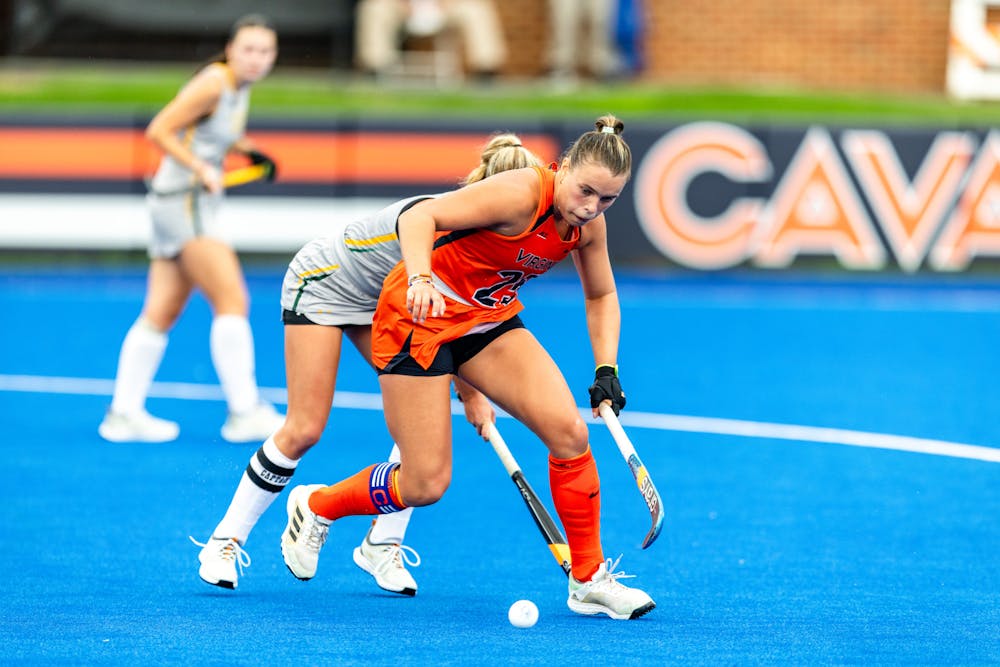Virginia field hockey always seems to be in contention for a national title. The Cavaliers have appeared in the NCAA Tournament 28 times since it was first held in 1981. With those opportunities, Virginia has advanced past the first round 14 times and made six appearances in the semifinals. But not once in 44 years has the team made the championship game.
The 2024 squad, ranked No. 3 in the nation, appeared like they might break the forty-four year curse after winning their first nine games of the season, including six over opponents currently in the national rankings. But Friday evening, as the Cavaliers trudged off the Boston College Field Hockey Complex in Newton, Mass., some may have thought another season with national championship hopes had gone awry.
The Cavaliers fell 3-2 in overtime to No. 11 Boston College. It was a devastating loss and the team’s first of the season. Despite a spectacular two-goal effort by junior midfielder Daniela Mendez-Trendler, Virginia was unable to complete the comeback after ceding two goals in the first half and converting on only two offensive looks despite having a 10-3 edge in shots.
While Friday’s lackluster result may have ended Virginia’s winning streak, it did not necessarily signal the end of a winning season overall. In the long run, the loss will be helpful because it exposed the weak points that went unnoticed behind the team’s perfect record, which had little chance of remaining as such for the entire season.
On the defensive end, Virginia did not amp up enough pressure early on against Boston College. The Eagles found it easy to slot a pair of shots past senior goalkeeper Tyler Kennedy before the halftime buzzer sounded. This is an important reminder that Kennedy’s season-long save percentage of .586 — which ranks eighth in the ACC — certainly leaves room for improvement. The Cavaliers will need to be more aggressive defensively to stop the bleeding before it leads to more losses.
What worked for Virginia in the second half against the Eagles was the high defensive pressure that forced Boston College’s forward line to pass back or risk turning over possession. The fast pace of play kept the Eagles on their heels, which not only aided Virginia’s defense but also allowed its offense to fire on all cylinders.
Creating more attacking chances is especially necessary for a unit that has struggled to convert in front of goal. Virginia totaled five corners against the Eagles but scored on none of them. On one of those occasions, the Cavaliers were up by two players but still could not find the back of the net. Their struggles amounted to a shot percentage of only .200, while Boston College went a perfect 3-for-3 on shots on goal to turn the tide of the matchup in its favor.
For the season, the Cavaliers are averaging 14.4 shots per contest versus only 2.9 goals, which amounts to a shot percentage of .203. In order to avoid further defeats, Virginia will have to keep its foot on the gas in the offensive third and capitalize on more of its opportunities, which will hopefully be plentiful with help from the backline.
It is also important to remember that Boston College is a team of high caliber which, going into the game, seemed slightly underrated. The Eagles had only lost to No. 4 Maryland and No. 1 Northwestern entering their game with Virginia, and both defeats occurred nearly a month before the Cavaliers traveled to play them. So losing on the road, in overtime, to an opponent of that formidability, is hardly a warning sign.
Additionally, Virginia made the semifinals last year after going just 11-5 in the regular season, a reminder which should serve to moderate any overblown anxiety about this Boston College loss. Last year, the team dropped games against Duke, Maryland and Liberty — three opponents they beat earlier this season — as well as Boston College and Louisville. All of that to say, a loss halfway through the season is not going to decide whether the Cavaliers put an end to their championship drought.
Virginia’s title chances will be made more clear after its next two games, which come at home against No. 7 Saint Joseph’s and No. 14 Syracuse. The Hawks are 9-2 on the season and rank second in the NCAA in goals per game, while the 8-3 Orange are tied for fifth in the country in shutouts.
With plenty of competition left to come, including No. 1 North Carolina, the end of the Cavaliers’ winning streak does not, in any way, signal the end of their postseason chances. In fact, the loss could be the key to a championship season — fixing the errors that are highlighted in defeat will strengthen the team in a way that a win could not have.
By the time November rolls around, the Cavaliers will be more than ready to shed the half-century curse and take home some hardware.







